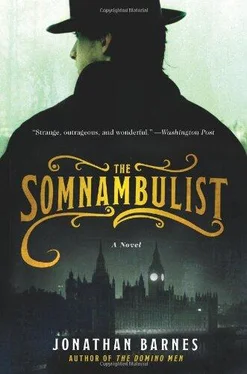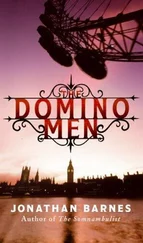Jonathan Barnes - The Somnambulist
Здесь есть возможность читать онлайн «Jonathan Barnes - The Somnambulist» весь текст электронной книги совершенно бесплатно (целиком полную версию без сокращений). В некоторых случаях можно слушать аудио, скачать через торрент в формате fb2 и присутствует краткое содержание. Жанр: Иронический детектив, Исторический детектив, на английском языке. Описание произведения, (предисловие) а так же отзывы посетителей доступны на портале библиотеки ЛибКат.
- Название:The Somnambulist
- Автор:
- Жанр:
- Год:неизвестен
- ISBN:нет данных
- Рейтинг книги:5 / 5. Голосов: 1
-
Избранное:Добавить в избранное
- Отзывы:
-
Ваша оценка:
- 100
- 1
- 2
- 3
- 4
- 5
The Somnambulist: краткое содержание, описание и аннотация
Предлагаем к чтению аннотацию, описание, краткое содержание или предисловие (зависит от того, что написал сам автор книги «The Somnambulist»). Если вы не нашли необходимую информацию о книге — напишите в комментариях, мы постараемся отыскать её.
The Somnambulist — читать онлайн бесплатно полную книгу (весь текст) целиком
Ниже представлен текст книги, разбитый по страницам. Система сохранения места последней прочитанной страницы, позволяет с удобством читать онлайн бесплатно книгу «The Somnambulist», без необходимости каждый раз заново искать на чём Вы остановились. Поставьте закладку, и сможете в любой момент перейти на страницу, на которой закончили чтение.
Интервал:
Закладка:
“A pretty fairy tale,” said Moon, peering again at the stone.
“This has always been a sacred place. Where we stand now Boudicca razed to the ground. In a few years’ time, archaeologists will find her revenge marked upon the earth beneath us in a seam of red soil, a scarlet thread running through London’s history. Even now there is a certain… thinness here. Can’t you feel it?”
Moon grimaced. “Listen,” he said, as reasonably as he knew how, “why don’t we forget all this and find ourselves a drink?”
“You need to understand the nature of the city,” Cribb said, rising to his feet. “Come. There is more to see.”
Riled by the man but still, despite himself, intrigued, Moon followed as they headed up Cannon Street and toward the center of the financial district. This was not an area of the city he had ever felt the need to wander in — despite its easy affluence there was something indefinably depressing about it, something gray and oppressive. Flocks of black-clad businessmen strutted through its streets, self-important crows oblivious to the passing of the conjuror and the ugly man. A distinctive scent, largely unfamiliar to Moon, was omnipresent: the acrid perfume of commerce, everywhere the rich, dry, second-hand smell of money.
They turned into King William Street and cut through to Threadneedle Street by way of Change Alley.
“Much of this district will be bombed,” Cribb said matter-of-factly.
“Bombed?”
“Destroyed, obliterated by explosives from the air.”
“Impossible.”
“Saint Swithin’s, for one, will be reduced to rubble in forty years. They build a bank on top of it. There’s nothing left to say the church ever existed.”
“How can you possibly know that?”
Cribb’s repulsive little face darkened for a moment. “I’ve seen it. More than once. The first bombs fall a decade or two from now, no more.”
Moon laughed. “You’re joking.”
Cribb smiled infuriatingly in response, then walked away, compelling Moon to adopt an undignified trot in order to catch up. They emerged into Threadneedle Street where the twin centerpieces of the city reared up before them — the great Guildhall and the Bank of England.
“I’ve always wondered about those,” Moon said idly and pointed up at a pair of statues which stood weather-beaten, monolithic guard over the doors of the Guildhall, two stone giants wielding wooden clubs and dressed in animal skins.
“So you are willing to learn.”
“I’m curious.”
Cribb rattled off the information with the self-assured authority of some articulate encyclopedia. “They are Gog and Magog. The last of England’s giants, brought here by Brutus to guard the city gates. Legend says they were banished from London by King Lud after a bloody quarrel.”
“How did you come to learn so much about the city?”
“I cannot leave. I am circumscribed by its limits. But this is not why I brought you here.” Cribb nodded toward the Bank of England. “Look.”
“I stopped a bank robbery there a few years ago,” Moon said conversationally. “The Somnambulist and I still laugh about it from time to time. Fellow tried to burrow into the vaults, hoping to get at the gold reserves, but ended up waist-deep in sewage. Thoroughly entertaining at the time.”
Cribb seemed irritated by the digression. “I want you to look at it. Really look at it. Try to see its true self, see the skull beneath the skin. Understand what it represents.”
A moment’s silence.
“The poison heart of London!” Cribb spluttered, suddenly splenetic with rage. “A monstrous canker at the center of the city! We are oppressed, Mr. Moon, and all around us are the signs and symbols of our subjugation.”
“If you say so.”
“Make no mistake: the city is at the heart of this business, the prime mover in these crimes. Now I have one more thing to show you.”
He walked away and Moon followed as they retraced their steps through King William Street and hurried onward to the Monument (an enormous Doric column erected in the seventeenth century in memory of the Great Fire).
Forgive me if the above sounds condescending — I add this last detail only for the benefit of the ignorant and for tourists. I should hope my readers educated enough to recognize the significance of Wren’s achievement without it being explained to them, but regrettably it remains the case that one must always make allowances for dullards. I cannot police the readers of this manuscript and it is a sad and tragic truth that I have never yet succeeded in underestimating the intelligence of the general public.
Close by the Monument on King William Street some construction was under way.
“Trains,” Cribb said briskly as they strode past. “They’re renovating the Underground.”
The two men paid for their tickets at the little booth outside, entered the Monument and climbed the corkscrew stone staircase to the top, emerging eventually into the chill autumn air, sweaty and panting. A flimsy metal rail seemed the only barrier between them and a queasily high drop.
The last visitors of the day were leaving (there had been several awkward moments on the stairs as various parties had attempted to squeeze and maneuver their way around one another) and for a few minutes Cribb and Moon had the view entirely to themselves.
They looked out across London. It had begun to rain, a thin colorless drizzle, and it was as though some drear and dusty veil had been draped across the panorama.
“Ugly, isn’t she?” Cribb said. “You see her now as she really is, without her make-up, without her rouge. After the Fire, Wren wanted to build a new city — the London of his dreams, a new Jerusalem, a shining metropolis constructed upon pure mathematical lines.”
“What happened?”
“The city defeated him. It refused to be bent into shape; it stayed a willful, sprawling, sinful place. It even told him as much. When he walked through the gutted wreck of old Saint Paul’s, he tripped and fell over a piece of rubble — a tombstone. When he got to his feet and dusted himself down he saw that it read, in Latin, ‘Resurgam’ — ‘I Will Rise Again.’ ”
“Are you trying to tell me something?”
“I’m doing my best. But there is a limit to what I can say.”
“Are you always so cryptic?”
Cribb grinned toothily. “The Monument is two hundred and two feet tall. Coincidentally the same height as the statue of Nelson in Trafalgar Square.”
“Is that significant?”
“Secret geometry, Mr. Moon. The city is filled with it.”
A guide appeared and pedantically informed them that opening hours were over and that they were to leave at once.
“Where now?” Moon asked once they were outside.
“Tea and scones, I think.”
Despite his may disreputable and insalubrious qualities, there was something arresting, even magnetic, about Thomas Cribb. Or so Moon assured me — I was never able to see it myself. Still, over tea and scones in a Cheapside coffee house, Moon found himself warming to the man, quizzing him incessantly on his knowledge of London history and trying to prize from him whatever it was he knew, but refused to tell, about the Human Fly and the Honeyman-Dunbar murders. Halfway through his second cup of Earl Grey, Moon asked a question which he had no idea how to verbalize without sounding foolish. In the event, he favored candor. “Why do you tell people you travel in time?”
Cribb toyed with his coffee spoon. “I say nothing of the kind. I admit merely that I have lived in the future.”
“I don’t believe you.”
“What you believe is your own affair. But I can tell you this: Nine years from now, the King will be dead. Thirteen years from now we will be at war and then again less than three decades later. In nineteen fifty-two, hundreds of Londoners will be killed by poisonous fog. Ten years later and the city’s skyline changes for ever — new buildings soar and scrape the sky. And a century hence great and terrible temples will be built where now our docks and shipping yards thrive and prosper.”
Читать дальшеИнтервал:
Закладка:
Похожие книги на «The Somnambulist»
Представляем Вашему вниманию похожие книги на «The Somnambulist» списком для выбора. Мы отобрали схожую по названию и смыслу литературу в надежде предоставить читателям больше вариантов отыскать новые, интересные, ещё непрочитанные произведения.
Обсуждение, отзывы о книге «The Somnambulist» и просто собственные мнения читателей. Оставьте ваши комментарии, напишите, что Вы думаете о произведении, его смысле или главных героях. Укажите что конкретно понравилось, а что нет, и почему Вы так считаете.












